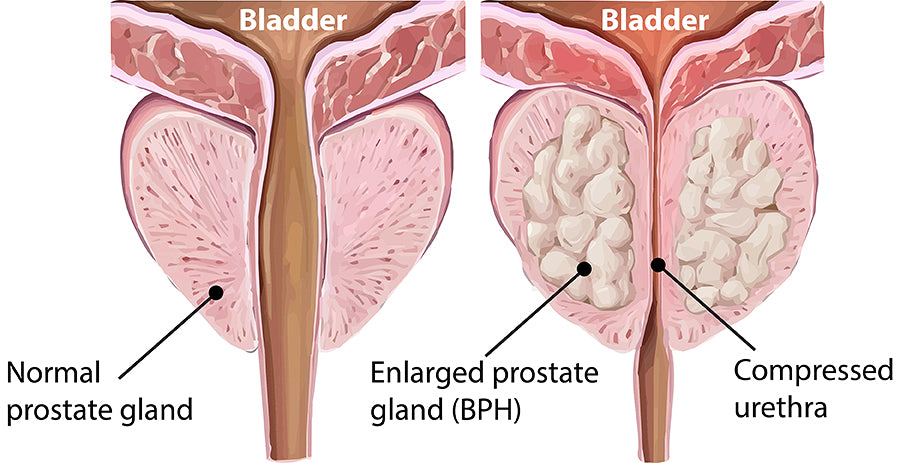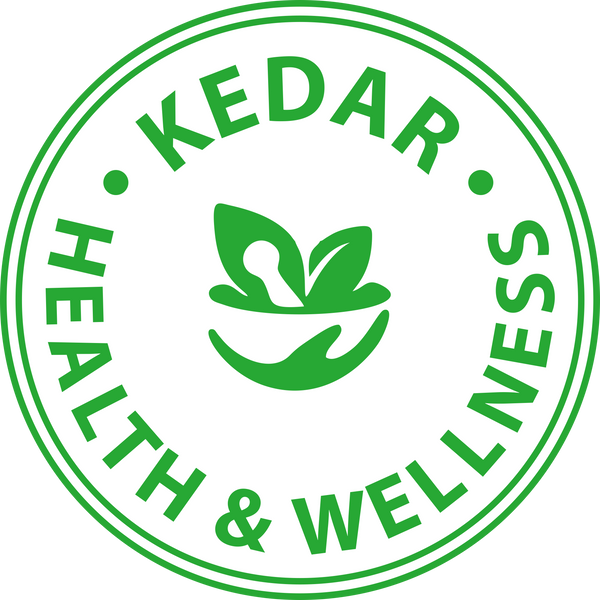
HOW DIET HELPS A HEALTHY PROSTRATE
Share
The Prostate (not prostrate) is a small, rubbery gland about the size of a ping-pong ball, located deep inside the groin, between the base of the penis and the rectum. It is important for reproduction, because it supplies part of the seminal fluid (semen), which mixes with sperm from the testes.

WHAT EXACTLY DOES THE PROSTATE DO?
The prostate is part of the male reproductive system and its function is to secrete a fluid that forms a constituent of semen. This fluid is alkaline and protects
sperm from the acidity inside the female reproductive organs. The prostate also contains muscles that help to expel semen during ejaculation.
Sexual dysfunction, fertility problems and incontinence are common problems experienced once the prostate has been removed, which is why this is not done unless absolutely necessary.

WHAT ARE THE RISK FACTORS?
The causes of prostate cancer are not fully understood, but there are several known risk factors, the greatest of which is age with the risk increasing rapidly from 50 years and upwards. The existence of prostate or breast cancer in an immediate family member also increases the risk to other family members. Men of African-American descent appear to have an increased risk while men of Asian descent have a lower risk. These risk factors cannot be modified.
IS YOUR DIET PUTTING YOU AT RISK?
There is growing scientific evidence that strongly suggests that diets that are rich in certain foods can help prevent prostate cancer and its spread. There is also evidence to indicate the harmful effect of other foods. Prostate cancer is often slow to develop and spread, so strategies that can influence its progression are worth considering. For those with the condition, a controlled diet may provide a means of treatment.
The link between diet and prostate cancer is reflected in the low disease rates in Asian countries where diets are low in meat and saturated fats, and high in plant foods, fiber and fish.This is a big contrast with the high incident rates in Western and African countries where diets are rich in meat and fat and low in plant foods. When people migrate from Asia to a Western country and adopt the diet and lifestyle of that country, their risk of prostate cancer increases - and the incidence of cancer in Asia is rising as societies there become increasingly Westernised.
ALLIUM VEGETABLES
These include garlic, onion, spring onions (scallions), shallots, leeks and chives. Some research suggests that men who eat a diet rich in these foods have a lower risk of developing prostate cancer. Allium vegetables contain compounds with anti-cancer properties. The taste and smell of allium vegetables comes from a group of organo-sulphur compounds. These are formed during the natural ageing process of the plant, or from the activity of an enzyme called alliinase that is released when the plant has been chopped or crushed. Allium vegetables are also often served with other foods, such as tomatoes, that have been identified as having anti-cancer properties so the effect may be from the combination rather
than from one type of vegetable alone.

HOW MUCH SHOULD I EAT?
The current UK guideline for fruit and vegetable consumption is at least five 80g portions a day. Although there are no specific guidelines for the consumption of allium vegetables, the World Health Organisation (WHO) suggests 2.5g (approximately one clove) of fresh garlic a day. Garlic should be left to stand for about ten minutes after crushing or chopping before cooking to allow the anticancer compounds time to form.
WHAT SHOULD I LIMIT?
When research is carried out into the links between diet and prostate cancer, some foods or food components show a positive relationship, such as dairy products, fat and meat. This means that eating them in large amounts may increase the risk of prostate cancer.
Dairy Products:
These include milk and all products made from milk, such as yogurt, cheese and fromage frais (is a soft,unaged, creamy fresh cheese made out of whole or skimmed milk and cream). The evidence for a close association between prostate cancer and dairy products comes from population studies.
Calcium In Dairy Products:
Dairy products provide a source of calcium, but some studies have shown a relationship between a high intake of calcium and an increased risk of prostate cancer. One of the suggested reasons for this is the relationship between calcium and Vitamin D, a potential anti-cancer agent. Calcium requires the action of Vitamin D to aid absorption therefore, when calcium intakes are high, the demand for Vitamin D increases and may lead to the suppression of Vitamin D in the blood. The relationship between an increased risk of prostate cancer and calcium appears to be most apparent when calcium intake is very high (1,500mg to 2,000mg per day) and in cases where the disease is more advanced, although the evidence is not consistent. Studies that have considered the risk of prostate cancer with non-dairy sources of calcium appear to show no association, although the effect of calcium supplementation is unclear. It’s imperative that we seek and gravitate towards plant based calcium in our nutritional regime. Sources of well-absorbed calcium for vegans include calcium-fortified soy milk and juice, calcium-set
tofu, soybeans and soy nuts, Bok Choy, broccoli, collards, Chinese cabbage, kale, mustard greens, and okra.
10 FOODS THAT FIGHT PROSTATE CANCER
There is strong evidence that eating certain foods can significantly cut a man's risk of prostate cancer.
Cruciferous Vegetables: Eating three or more servings of cruciferous vegetables like cauliflower, broccoli, kale, mustard greens, and Brussels sprouts per week may reduce the risk of prostate cancer by almost half.
Pomegranate Juice: Research shows that pomegranate juice slows the growth of prostate cancer in mice.
Turmeric: Studies show that turmeric may prevent prostate cancer and slow its progress, especially when eaten with cauliflower.
Flaxseeds: Studies in mice indicate that flaxseeds may prevent and slow the spread of prostate cancer.
Green Tea: In several studies, green tea has been shown to significantly reduce the risk of developing prostate cancer.
Brazil Nuts: Brazil nuts are one of the best natural sources of selenium, a mineral that is strongly preventative against prostate cancer. Experts say that taking an extra 200mcg of selenium per day will reduce the risk of prostate cancer by 50 percent. Just a handful of Brazil nuts per day will meet this requirement.
Garlic: Garlic has been shown in several studies to cut the risk of prostate cancer by as much as 53 percent. Garlic also contains a good amount of selenium.
Scallions: Studies show that eating just 1/10 an ounce of scallions per day cut men's risk of prostate cancer by as much as 70 percent.
Tomatoes: Tomatoes are one of the best sources of lycopene, a powerful antioxidant which has been shown in several studies to have a protective effect against prostate cancer. The National Prostate Cancer Foundation recommends that men eat plenty of foods containing lycopene.
Take a look at the Kedar Gentlemen's Lounge to find your men's health products.
Information in this write-up was culled from various sources for public education.
